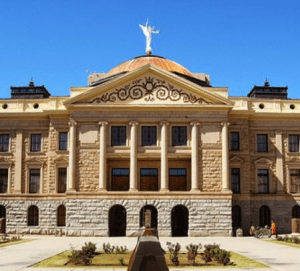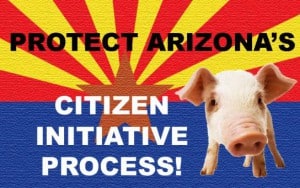The 2018 Arizona Legislative session marked yet another failure of the felony animal cruelty bill. Lawmakers ran their annual attack aimed at limiting or dismantling Arizona’s citizen initiative process — the single most important tool for protecting animals. Unlike in 2017, none of the damaging measures passed. Senator Hobbs introduced legislation to repeal the disastrous strict compliance measure (HB 2244) passed in 2017, but her bill was not even granted a committee hearing. HB 2244 is discussed in the ‘Attack on Citizen Initiative Rights’ section in this report.
 Humane Voters of Arizona (HVA) is a member of the Humane Legislative Coalition of Arizona (HLCA), an alliance of local animal advocacy organizations comprised of Animal Defense League of Arizona, Arizona Humane Society, the Humane Society of Southern Arizona, and HVA. As in previous sessions, HLCA worked to pass legislation to increase penalties for the most egregious cases of animal cruelty, to prevent those crimes from being reduced to misdemeanors. Senator Kavanagh again sponsored the felony cruelty bill (SB 1295), which passed the Senate but was killed by a single legislator, Representative Eddie Farnsworth, who blocked the bill in the House.
Humane Voters of Arizona (HVA) is a member of the Humane Legislative Coalition of Arizona (HLCA), an alliance of local animal advocacy organizations comprised of Animal Defense League of Arizona, Arizona Humane Society, the Humane Society of Southern Arizona, and HVA. As in previous sessions, HLCA worked to pass legislation to increase penalties for the most egregious cases of animal cruelty, to prevent those crimes from being reduced to misdemeanors. Senator Kavanagh again sponsored the felony cruelty bill (SB 1295), which passed the Senate but was killed by a single legislator, Representative Eddie Farnsworth, who blocked the bill in the House.
The Legislature passed two controversial bills that contained a section of language beneficial to animals. HLCA helped to get language to protect animals inserted into SB 1376, which requires landlords who find abandoned pets in vacated properties to provide care for the animals. Another bill, HB 2211, exempts all domestic animals or household pets from
seizure under Arizona bankruptcy law, allowing persons filing for bankruptcy to keep their pets. Both bills were signed into law by Governor Ducey. Although sections of these measures offered protection for animals, they were primarily unrelated to animals. Many legislators that are usually supportive of animal protection opposed the bills based on issues unrelated to animals.
Legislators also ran several contentious bills related to service animals and passed HB 2522, which prohibits misrepresentation of service animals.
Late in the session legislators introduced a school protective order bill which included language allowing a Severe Threat Order of Protection (STOP) to be ordered for minors that cruelly mistreat animals. However the language related to animals was struck from the bill, which failed to pass.
The Good Bills
HLCA Supported Bill
 SB 1295, animal cruelty; domestic animals; classification (Kavanagh), would have strengthened Arizona’s animal cruelty law. HVA and other HLCA groups worked with Maricopa County Attorney Bill Montgomery and bill sponsor Senator John Kavanagh to develop a bill that would have strengthened penalties against convicted animal abusers.
SB 1295, animal cruelty; domestic animals; classification (Kavanagh), would have strengthened Arizona’s animal cruelty law. HVA and other HLCA groups worked with Maricopa County Attorney Bill Montgomery and bill sponsor Senator John Kavanagh to develop a bill that would have strengthened penalties against convicted animal abusers.
Violent crimes against family pets are often part of a larger pattern of domestic violence, but Arizona law only allows even the most heinous crimes be charged at the lowest felony designation – felony 6. The current law was written before the relationship between animal abuse and domestic violence was well understood. That is no longer the case. Countless studies over the past several decades have clearly demonstrated that violent offenders frequently have histories of serious and repeated animal cruelty. The FBI recognizes the connection between animal abuse and human abuse and now collects data on animal abuse. Research has shown consistent patterns of animal cruelty among perpetrators of other forms of violence, including child, spousal and elder abuse.
 In a senate committee hearing on SB 1295 Deputy Pima County Attorney Kathleen Mayer testified that judges are free to decide that Class 6 felonies should instead be sentenced as misdemeanors and placed on unsupervised probation and are not required to get treatment. But a judge can require those convicted of Class 5 felonies to get help to deal with issues of anger and lack of empathy. Maricopa County Attorney Bill Montgomery told committee members that this is about more than animals.
In a senate committee hearing on SB 1295 Deputy Pima County Attorney Kathleen Mayer testified that judges are free to decide that Class 6 felonies should instead be sentenced as misdemeanors and placed on unsupervised probation and are not required to get treatment. But a judge can require those convicted of Class 5 felonies to get help to deal with issues of anger and lack of empathy. Maricopa County Attorney Bill Montgomery told committee members that this is about more than animals.
“Animal abusers are five times more likely to commit violent crimes against people than non-abusers,” he said. “And 70 percent of those charged with cruelty to animals were known to police for other violent behavior, including homicide.”
Increasing penalties for heinous cases of pet abuse gives prosecutors a crucial tool to ensure that the sentence reflects the severity of the crime. SB 1295 would have ensured that the most violent abusers would be facing a Class 5 felony.
SB 1295 passed the Senate by a bipartisan vote of 16-13-1. You can see how senators voted here. It was disappointing that some animal-friendly senators opposed the bill. Senators Dalessandro, Mendez, and Quezada have excellent records on animal protection issues, yet all voted ‘no’ on SB 1295.
The bill was transferred to the House and was assigned to Representative Eddie Farnsworth’s Judiciary Committee. As chairman, he refused to grant SB 1295 a hearing in his committee or release it to a friendlier committee. Unfortunately, in the Arizona Legislature sometimes just one lawmaker can block a bill, causing its demise before receiving a full vote. For the third year in a row, legislation to address egregious animal cruelty died in the House.
Bills with Sections that Protect Animals
As referenced earlier in this report, the Legislature passed two controversial bills that included language that is helpful to animals. Both measures were sponsored by legislators that have a poor record on animal protection. The bills each contained language unrelated to animals that was opposed by many legislators that support animal protection.
 SB 1376, landlord tenant act; personal property, (Griffin) helps animals that have been abandoned in vacated properties. HLCA consulted with bill supporters to add language that requires landlords who find abandoned animals in their vacated properties to immediately remove the pets and release them to a shelter, provide reasonable care, or alert animal control. The bill passed the Senate 21-9 and the House 33-25-2 and was signed by Governor Ducey.
SB 1376, landlord tenant act; personal property, (Griffin) helps animals that have been abandoned in vacated properties. HLCA consulted with bill supporters to add language that requires landlords who find abandoned animals in their vacated properties to immediately remove the pets and release them to a shelter, provide reasonable care, or alert animal control. The bill passed the Senate 21-9 and the House 33-25-2 and was signed by Governor Ducey.
HB 2211, bankruptcy exemption; personal property (Thorpe: Barton, Clodfelter, Finchem, John, et al.), exempts all domestic animals or household pets from seizure under Arizona bankruptcy law, allowing persons filing for bankruptcy to keep their pets. The bill passed the House 34-25-1, the Senate 16-12-2, and was signed by Governor Ducey.
SB 1519, (Smith: Yarbrough) protective orders; schools; appropriations, was another contentious measure unrelated to animals that included language beneficial to animals. As introduced, this bill which was supported by Governor Ducey, included language allowing a Severe Threat Order of Protection (STOP) to be ordered for minors that cruelly mistreat animals. However, a strike everything amendment passed by the Senate Commerce and Public Safety Committee, removed all language related to animal cruelty from bill. The amended bill passed the Senate but died in the House.
Other Pro-Animal Legislation
SB 1116, driving; animal on lap; prohibition (Kavanagh), would have prohibited a person from operating a vehicle with an animal on the person’s lap. The bill was held in Senate Transit Committee.
 SB 1368, G&F; appointment recommendation board; repeal (Mendez), would have repealed the industry-controlled board that recommends candidates to the Arizona Game and Fish Commission (AZGFC) that is charged with managing and protecting wildlife. Arizona had an appointment process through which applicants would apply directly to the governor’s office until 2010, when the Legislature passed a measure that created a recommendation board controlled by ranchers and trophy hunting clubs to appoint candidates to the AZGFC. The governor is limited to selecting only “board-endorsed” candidates.
SB 1368, G&F; appointment recommendation board; repeal (Mendez), would have repealed the industry-controlled board that recommends candidates to the Arizona Game and Fish Commission (AZGFC) that is charged with managing and protecting wildlife. Arizona had an appointment process through which applicants would apply directly to the governor’s office until 2010, when the Legislature passed a measure that created a recommendation board controlled by ranchers and trophy hunting clubs to appoint candidates to the AZGFC. The governor is limited to selecting only “board-endorsed” candidates.
Since then, the AZGFC has become increasingly more industry-friendly, catering to ranchers and trophy hunting groups that it considers primary stakeholders. AZGFC appears to view predators as competition rather than crucial components of healthy ecosystems, which has led to detrimental rulemaking and policies based on politics rather than the best science. Senator Mendez has introduced this legislation several times but it has never been granted a committee hearing.
SB 1440, initiatives; strict compliance; repeal, (Hobbs), would have repealed HB 2244, passed by the Legislature in 2017, that requires strict compliance for initiatives. The bill died without being granted a hearing in Senate Judiciary Committee.
The Bad Bills
Attack on Citizen Initiative Rights
Over the past seventeen years, Arizona legislators have launched attacks on our citizen initiative and referenda process. Aimed at dismantling citizens’ voting rights, these bills are potentially damaging to animals on a large scale. Arizona’s citizen ballot measure process is the single most important tool for protecting Arizona’s animals.
 Arizona’s public initiative process is a constitutional right which was enacted at statehood in 1912. Thanks to grassroots citizen ballot measures, voters banned leghold traps, snares, and poisons on public lands in 1994. Cockfighting was outlawed in 1998. In 2006, voters prohibited the cruel confinement of pregnant pigs and calves raised for veal in industrial agriculture operations. All of these measures failed in the Legislature, yet were passed by Arizona voters, most by large margins. In 1998 voters passed Proposition 105, the Voter Protection Act, to prevent the Legislature from undermining citizen initiatives and to protect measures passed by voters.
Arizona’s public initiative process is a constitutional right which was enacted at statehood in 1912. Thanks to grassroots citizen ballot measures, voters banned leghold traps, snares, and poisons on public lands in 1994. Cockfighting was outlawed in 1998. In 2006, voters prohibited the cruel confinement of pregnant pigs and calves raised for veal in industrial agriculture operations. All of these measures failed in the Legislature, yet were passed by Arizona voters, most by large margins. In 1998 voters passed Proposition 105, the Voter Protection Act, to prevent the Legislature from undermining citizen initiatives and to protect measures passed by voters.
There have been several referenda placed on the ballot that could have destroyed the public initiative process, but voters overwhelmingly defeated all of them, indicating the strong determination of citizens to defend voting rights. As the latest poll results indicate, Arizona voters strongly support animal protection and our public initiative process. Despite all of these factors, the Arizona Legislature continually attempts to weaken or overturn citizen initiatives, indicating how out of touch certain lawmakers are with the will of their constituents.
Has the Arizona Legislature Endangered Citizen Initiatives?
In 2017 the Arizona Legislature passed two bills that have severely damaged our public initiative process. HB 2404 prohibits initiative signature gatherers from being paid based upon the number of signatures collected, which greatly increases costs for ballot measure campaigns. Lawmakers also passed HB 2244, which changed the state’s standard of ‘substantial compliance’ for initiatives to ‘strict compliance’, which could result in valid signatures being tossed out for even the smallest technical mistake, such as using the wrong margin size. Following the 2017 session a lawsuit was filed to invalidate HB 2244 on Constitutional grounds. The case is currently being appealed to the Arizona Supreme Court.
The first casualty of these damaging measures was the citizen initiative to protect Arizona’s wild cats from trophy hunting and trapping. Despite strong public support, the campaign was suspended in April, 2018. The blame for the campaign’s suspension rests primarily on the Arizona Legislature, which may have finally succeeded in killing our citizen initiative process. The Legislature’s passage of bills forcing strict compliance and restrictions on paid signature gatherers has made it even more difficult, time consuming and expensive for citizens to place a measure on the ballot. The challenge proved insurmountable for the wild cat initiative, a grassroots campaign relying largely on volunteers.
2018 Anti-Initiative Bills
HB 2121, ballot measures; paid circulator definition (Leach), would have added restrictions to the definition of a paid signature collector. The bill passed the Legislature but was vetoed by Governor Ducey.
 HCR 2008, initiatives; conflicting federal law; preemption (Leach), would have allowed the Attorney General to inform the Secretary of State if an initiative conflicts with federal law and have it removed from ballot. The bill failed in the House Federalism, Property Rights and Public Policy Committee.
HCR 2008, initiatives; conflicting federal law; preemption (Leach), would have allowed the Attorney General to inform the Secretary of State if an initiative conflicts with federal law and have it removed from ballot. The bill failed in the House Federalism, Property Rights and Public Policy Committee.
SCR 1001, initiatives; single subject; title (Kavanagh), would have required initiatives to contain only one subject and for that subject to be expressed in the title of the initiative. This requirement would have made it extremely difficult to draft citizen initiatives and easier to challenge them. The bill was held in Senate Judiciary Committee.
SCR 1002, initiatives and referendums; reauthorization (D. Farnsworth), would have required the public to revote every ten years on initiatives passed by voters (starting in 2018). This requirement would have been devastating and costly, especially for grassroots campaigns. The bill was assigned to Senate Judiciary Committee, but did not receive a hearing.
SCR 1005, NOW: state; municipal corporation; industrial pursuits (Petersen), was a strike-everything amendment that would have repealed citizen initiatives with funding sources attached after ten years. Although no animal protection initiative passed in Arizona has funding sources attached, SCR 1005 is nevertheless an attack on our citizen initiative process. The bill died in the House before receiving a full vote.
Other Bad Bills
HB 2153, campaign finance; nonprofits; disclosure (Leach), limits local government’s ability to require certain non-profits to register as political committees and disclose donors. This legislation is an attempt to override Tempe’s ordinance to require disclosure of contributors to local elections. The bill passed the House 33-25-2 and the Senate 17-13 and was signed by Governor Ducey.
 HB 2210, public lands; ownership; control; litigation (Finchem: J. Allen, Barton, Bowers, et al.), could have allowed a state takeover of Arizona’s public lands, weakening protection for wildlife and habitat. The measure passed House Land, Agriculture, and Rural Affairs Committee but was held in Rules.
HB 2210, public lands; ownership; control; litigation (Finchem: J. Allen, Barton, Bowers, et al.), could have allowed a state takeover of Arizona’s public lands, weakening protection for wildlife and habitat. The measure passed House Land, Agriculture, and Rural Affairs Committee but was held in Rules.
SCM 1008, endangered species act; urging Congress (Griffin: Clodfelter), requests that Congress pass the Saving America’s Endangered Species Act (SAVES Act). This deceptively titled bill would remove non-native species from protection under the Endangered Species Act, leaving elephants, rhinos, tigers, and other species vulnerable to wildlife traffickers. It would also remove regulatory reporting for non-native captive endangered wildlife in the U.S. The bill passed the Senate 17-13 and the House 35-24-1 and was transmitted to the Secretary of State.
Legislative Scorecard
The 2018 Legislative session was unusual because many bills affecting animals either failed or were held in committees, and therefore did not receive votes from the entire Senate or House. Also, the Legislature ran some controversial bills that included sections that were beneficial to animals. Many pro-animal legislators opposed those bills for reasons unrelated to animal protection.
In the 2018 session there was only one measure that HLCA expended efforts to pass. As stated earlier in this report SB 1295 passed the Senate but was stalled in the House after Rep. Eddie Farnsworth refused to hear the bill in his committee. You can see how senators voted here. Since there was no floor vote in the House, there are no voting records for representatives on SB 1295.
For these reasons HVA is not including a legislative scorecard for the 2018 session. However, legislators can have an impact on animals beyond their voting record by sponsoring bills or preventing bills from passing. Please see comments in this report for actions taken by lawmakers that impacted animal-related legislation.
 For information on legislators’ recent voting records please refer to the HVA 2017 Legislative Report and Scorecard.
For information on legislators’ recent voting records please refer to the HVA 2017 Legislative Report and Scorecard.
Although animal protection and initiative bills provide a gauge for reviewing lawmakers, other bills that impact animals are those that affect wildlife habitat. For legislative information on conservation measures, including voting records and scorecards visit the Arizona Sierra Club’s legislative page.
For more information on this legislative report please email humanevotersarizona@cox.net.
Advocates
HVA thanks the following representatives of the Humane Legislative Coalition of Arizona: Stephanie Nichols-Young: Animal Defense League of Arizona, Kelsea Patton and Dr. Steve Hansen: Arizona Humane Society, Scott Bonsall-Cargill: Humane Voters of Arizona, Mike Duffey: Humane Society of Southern Arizona, Stacy Mann Pearson and Chad Campbell: Strategies 360, and government advisor Brian Tassinari of Willetta Partners
HVA thanks Maricopa County Attorney Bill Montgomery and animal cruelty prosecutors with the Maricopa County Attorney’s Office, Deputy Pima County Attorney Kathleen Mayer, and Kellye Pinkleton, AZ Director of The Human Society of the US for their efforts on the felony animal cruelty bill.
As always, HVA appreciates the tireless efforts of Sierra Club Arizona Director Sandy Bahr to protect wildlife, habitat, and citizens’ voting rights.
HVA greatly appreciates the efforts of Arizona Advocacy Network, other groups, and volunteers who testified in committees against the anti-initiative bills, and the many citizens that contacted their lawmakers and the governor’s office. Thanks attorneys Roopali Desai and Tim Hogan for their efforts on the HB 2244 lawsuit.
Finally, thanks to Stephanie Nichols-Young and Scott Bonsall-Cargill for their valuable input on this report.
For more information on legislation visit the HVA website. Thanks to Salvatore Prano for designing and hosting the HVA website.
